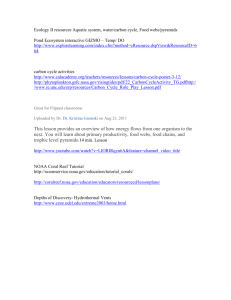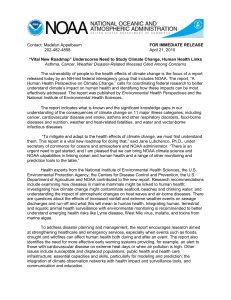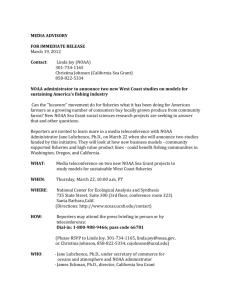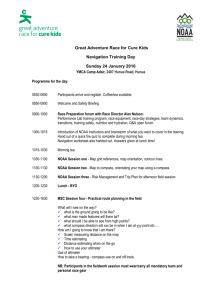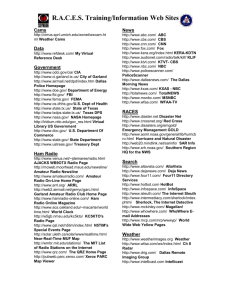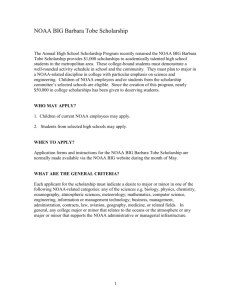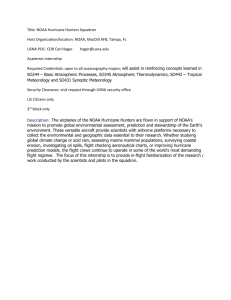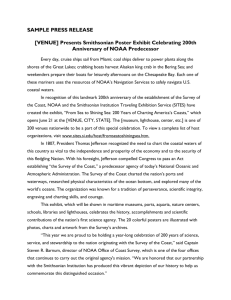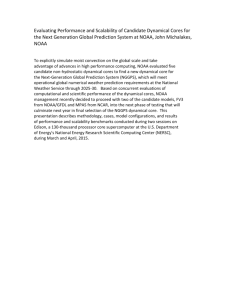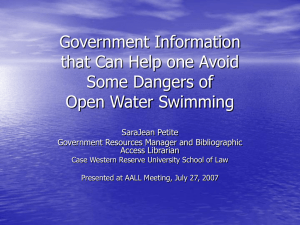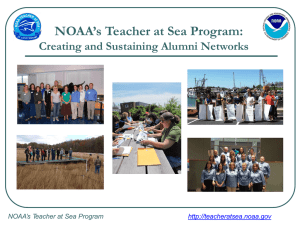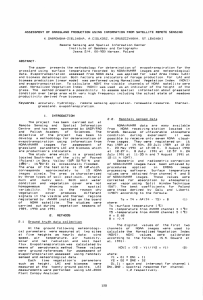NOAA Partnership Policy – The First Year AMS Symposium on the
advertisement
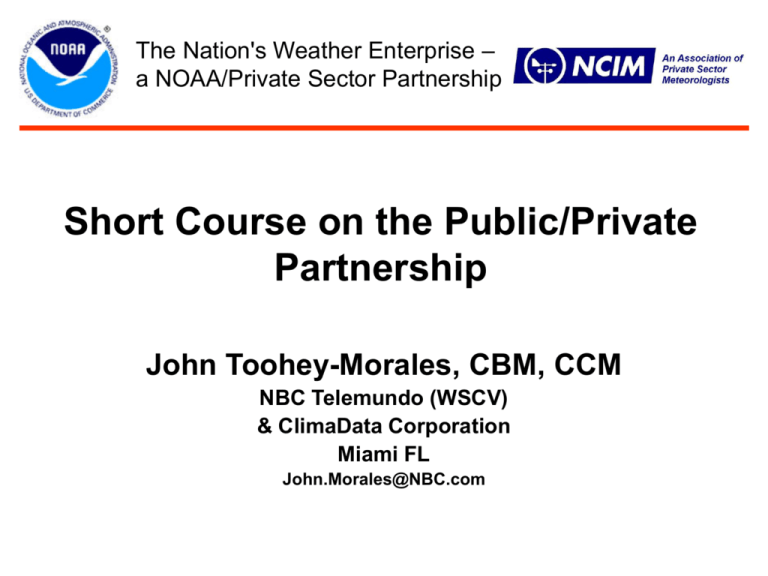
The Nation's Weather Enterprise – a NOAA/Private Sector Partnership Short Course on the Public/Private Partnership John Toohey-Morales, CBM, CCM NBC Telemundo (WSCV) & ClimaData Corporation Miami FL John.Morales@NBC.com Timeline 2003 (Jan) – NRC “Fair Weather” published 2004 (Jan) – NOAA partnership policy proposed 2004 (Mar) – AMS sponsored Webcast 2004 (Jun) – Comments close 2004 (Dec) – NOAA partnership policy issued 2005 (Jan) – AMS CWCE Commission formed 2005 (Jun) – NWS policy implements partnership policy 2005 (Aug) – Policy clarification proposed 2006 (Jan) – Policy clarification adopted 2006 (Jun) – Short course “Live version” 2007 (Jan) – Short course “Module” on CD & online June 1, 2006 2 Background Slides (partnership policy text) Complete text of partnership policy clause 4: (Language adopted in clarification highlighted) The nation benefits from government information disseminated both by Federal agencies and by diverse nonfederal parties, including commercial and not-for-profit entities. NOAA recognizes cooperation, not competition, with private sector and academic and research entities best serves the public interest and best meets the varied needs of specific individuals, organizations, and economic entities. NOAA will take advantage of existing capabilities and services of commercial and academic sectors to support efficient performance of NOAA's mission and avoid duplication and competition in areas not related to the NOAA mission. NOAA will give due consideration to these abilities and consider the effects of its decisions on the activities of these entities, in accordance with its responsibilities as an agency of the U.S. Government, to serve the public interest and advance the nation's environmental information enterprise as a whole. June 1, 2006 3 Realities • The private sector wouldn’t exist without data and products from the public sector • The public sector can’t fulfill it’s mission without the private sector’s involvement • Collaboration is the only sensible strategy for all sectors June 1, 2006 4 Weather Enterprise Realities • The collaborative model is winning out over the competitive model around the world – Europe – Canada • Collaboration has a long and successful history in the U.S. – Media – Aviation June 1, 2006 5 Examples and Models • WSR88D Level 2 Data – Model: Value-added • Lightning Detection Networks – Model: Commercial fee for service • Severe Weather Alerts – Model: Hybrid June 1, 2006 6 Everyone Benefits • Public – Receives more relevant and actionable weather information – Perceives the weather enterprise to be of considerable value • Government – Reduce costs – Focus on core mission • Private Sector – Grow revenues – Expand employment June 1, 2006 7 TRUST grows the pie • This course aims to train weather enterprise professionals in both the private sector and government on how they can work together more effectively to advance the Weather Enterprise as a whole • Participants will not just learn the basics relevant to the nature of government institutions and private enterprises, but will experience “walking a mile in each others shoes” through a case study approach June 1, 2006 8 Learning Objectives 1. Introduce participants to the size, scope, structure, function and complexity of establishing and maintaining a thriving public/private partnership. 2. Explore major issues pertaining to government and private sector roles in the Weather Enterprise. June 1, 2006 9 Key themes and topics • Develop an understanding of the challenges faced by participants in the weather enterprise who work in roles other than your own, in particular: – Private sector participants will develop an understanding of the challenges faced by government decision makers asked to balance different demands for services. – Government participants will develop an understanding of the challenges faced by private companies in maintaining a viable business • What are key differences between public and private sector organizations such as funding and planning, and how do these differences affect the partnership? June 1, 2006 10 Key themes and topics • Introduce participants to the breadth and diversity of client needs served by the Weather Enterprise. • Reinforce the need for collaboration as a result of inter-sector dependency within the Weather Enterprise. • What do words like customer, competition, partnership, and disintermediation mean and are they helping or hurting collaboration? • Improve communication between public and private sector participants. June 1, 2006 11 Content Example: Weather issues addressed by entrepreneur Chris Bedford Sailing Weather Services What kind of boat should be designed? How long will the race take? How much food do we need? What kind of clothes should we take? What quantity of fuel is needed to run generators, pumps, computers, and satellite receivers? June 1, 2006 12 Content Example: Weather issues addressed by entrepreneur Chris Bedford Sailing Weather Services Where should we go? Is one route favored over another? What are the odds of success given different routing options? What data do we need and how to we get it? June 1, 2006 13 “A strong partnership makes this work possible.” Chris Bedford, Sailing Weather Services “75% of my work relies on data from US Government resources.” I provide interpretation and consulting focused on the client needs. I add value to existing information, and also seek out new and different resources. I develop new data, observations, and tools targeted to specific requirements. June 1, 2006 14 The Nation's Weather Enterprise – a NOAA/Private Sector Partnership Distance Learning Module (Jan ’07) • FREE Interactive mini-CD to interested parties (beginning at AMS meeting in San Antonio) • Also to be made available ONLINE (site TBA) • Questions, comments, requests: John Toohey-Morales Tel. 305-661-9144 June 1, 2006 John.Morales@NBC.com morales@climadata.com 15
